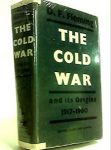 Name: Denna Fleming
Name: Denna Fleming
Lived: 1893-1980
Nationality: American
Profession(s): Academic, historian
Books: While America Slept (1944), Can We Win the Peace? (1944), The Cold War and its Origins, 1917-1960 (1961), The Issues of Survival (1973).
Perspective: Revisionist
Fleming was born in Paris, Illinois and graduated from Eastern Illinois State College in 1912. He worked as a high school teacher and principal before enlisting in the United States military toward the end of World War I. After the war, Fleming returned to teaching in schools and colleges. He completed a doctorate at the University of Illinois (1928), then accepted a professorship at Vanderbilt University, Tennessee.
Fleming remained at Vanderbilt for three decades. During the 1940s, he hosted a radio programme in Nashville that discussed World War II and international affairs. Fleming retired from Vanderbilt in 1961, the same year he published his popular book The Cold War and its Origins.
Fleming’s work contains strident criticisms of United States foreign policy during the 20th century. He blames America’s unwillingness to lead the League of Nations for contributing to World War II. Fleming sees Washington’s refusal to accept the consequences of World War II as a direct cause of the Cold War. Rather than attempting to work with Stalin and the Soviets to modify communism, American leaders simply painted communism as the “next great enemy”.
Fleming is particularly severe on the presidency of Harry Truman and the Truman Doctrine, an explicitly confrontational and aggressive foreign policy. The Soviets had no desire to war against the West, writes Fleming, yet Soviet aggression became an accepted certainty that shaped Western policy, at least until 1960.
Quotations
“The splitting of the world into two almost equal rival parts… was the inescapable and inexorable consequence of two world wars… It was these wars which shattered the rule of Europeans over the entire globe, ended the undisputed sway of democratic capitalism over it, and brought into question the ultimate survival of our way of life.”
“Communism is not the cause of the West’s loss of control over the vast bulk of Eurasia; it is the consequence.”
“We [the United States] do not seem able to learn the lesson of each succeeding world crisis until it is too late. During World War II we repented of our tragic failure to lead the League of Nations and we took our place at the head of a new league.”
“Our leadership in the League [of Nations] might not have made the difference… But the haunting remorse lingers that we did not try.”
“Soviet control of eastern Europe was the price we paid for the years of appeasement of Hitler, and it was not a high price.”
“There are some who think the Cold War did not begin until around 1947, but it is clear… that President Truman was ready to begin it before he had been in office two weeks. The years of labour by Roosevelt and Hull to build a basis of understanding with the Soviet leaders which would last through the peacemaking were cancelled out on April 23rd 1945.”
“From the eminence of 11 days in power, Harry Truman made a decision to lay down the law to an ally which had contributed more in blood and agony to the common cause than we had – and about Poland, through which the Soviet Union had been invaded three times since 1914.”
“Concerning Russia, nothing had changed with Truman since 1941, when he wanted both Germany and Russia destroyed in the war, and thought we should try to manage it that way.”
“On its face [the Truman Doctrine] was the rashest policy ever enunciated by any American leader. For the first time in history, the encirclement of a great power was openly proclaimed… What [the Soviet Union] would do, after the Cold War was declared by Churchill and Truman, was easily predictable by any average man.”
“It is an easy retreat from reality to say that no ruler of a great power would ever be mad or frightened enough to give the order [for nuclear war]. But humane men reasoned in the same way in early 1914, as well as in 1938, and no man can be safe until peace is made, and until some curbs are put upon the power of governments to assert their sovereign wills against each other once too often.”
“Fighting man has at last reached the end of the road. Hereafter, he will learn to cooperate or he will cease to exist.”
With the exception of quotations, content on this page is © Alpha History 2018. This content may not be republished or distributed without permission. For more information please refer to our Terms of Use. This page was written by Jennifer Llewellyn and Steve Thompson. To reference this page, use the following citation:
J. Llewellyn & S. Thompson, “Historian: Denna Fleming”, Alpha History, accessed [today’s date], https://alphahistory.com/coldwar/historian-denna-fleming/.
